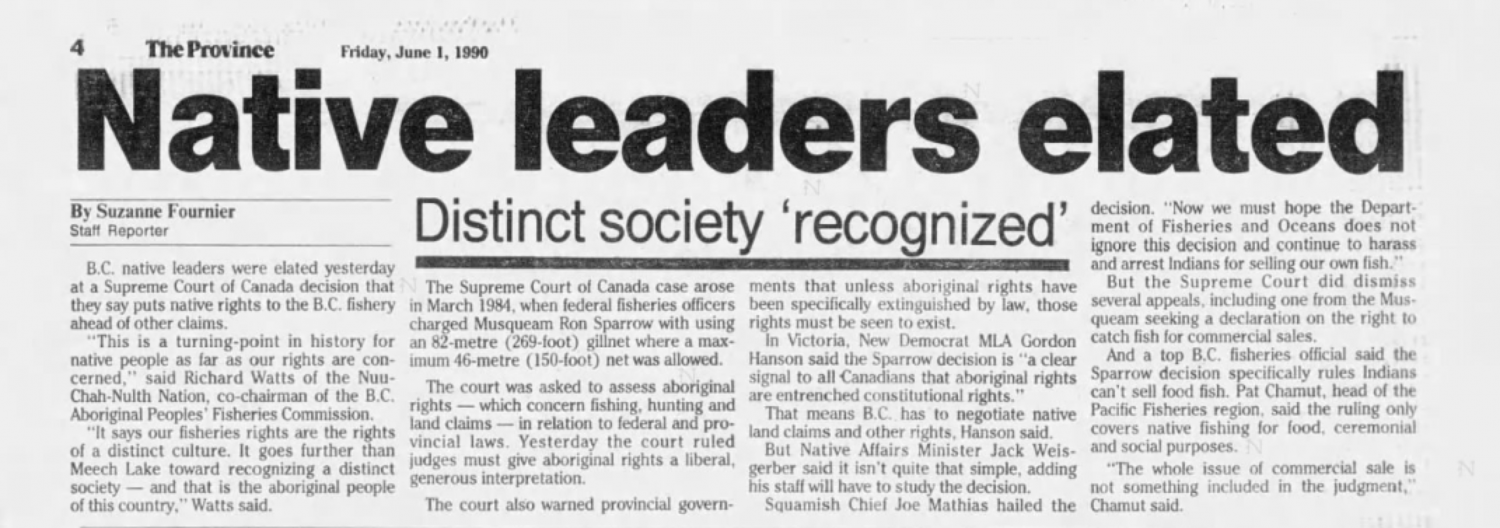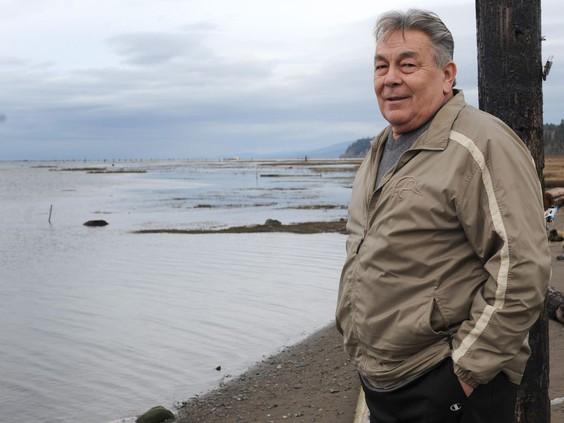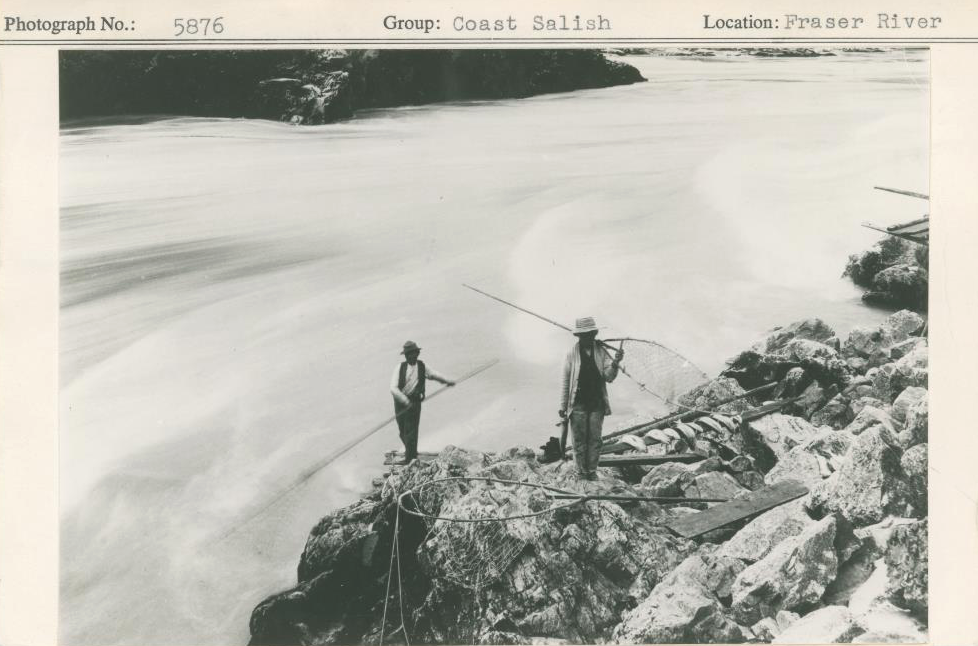The Arrest of Ronald Sparrow
Musqueam member’s hard-fought victory to protect his Indigenous rights
Date: 1984
One spring day in 1984, Ronald “Bud” Sparrow, a Musqueam fisherman, was arrested while fishing for chinook salmon on the Fraser River. The problem, according to federal authorities, was Sparrow’s drift net. It measured 82 metres, nearly twice the length of the limit imposed on Indigenous fishers. What might seem like a simple infraction set Sparrow on a six-year legal battle and resulted in a landmark Supreme Court decision that affirmed the rights of Indigenous people in Canada — but not without limitations.
Sparrow’s ancestors had fished the Fraser for generations. But after Europeans arrived, settler fishermen gained increasing control over the waters the Musqueam and other local First Nations had long depended on. Eventually, the federal government, which oversees Canada’s waterways, introduced regulations further limiting Indigenous fishers. Granted “food fishing” licences, they could now legally fish only for personal consumption.
After Sparrow’s arrest, the Musqueam decided to fight the charge against him. In crafting an argument to defend their traditional rights, they looked to the 1982 Constitution Act, passed only two years before.
Sparrow and his lawyers argued that the Musqueam had a distinct right to fish on their ancestral land. Any infringement on that right was "invalid" unless intended to protect the local supply of fish, they said. And in this case, that wasn’t so. Crucially, they pointed to Section 35 of the constitution. It “affirms” all “existing Aboriginal and treaty rights of the Aboriginal peoples of Canada.” The Musqueam — like most First Nations in British Columbia — haven’t signed any treaties giving up control over their traditional territory. Since the Musqueam had been fishing on the Fraser River long before Europeans arrived, they argued that it represented an “existing Aboriginal right.”
The B.C. Provincial Court disagreed and sided with the federal government. So did the B.C. County Court and the B.C. Court of Appeals. But Sparrow didn’t give up. In 1988, the case landed at the Supreme Court of Canada. Two years later, he won. The court agreed that the Musqueam’s right to fish had not been extinguished and couldn’t be limited without clear justification. The precedent-setting decision was widely heralded as a victory not only for the Musqueam but for First Nations across Canada. For the first time in the country's history, a court had acknowledged that Indigenous people had rights that predate Canada's existence.
But that didn't mean the government could not place limits on Indigenous rights, according to the court. The ruling led to the so-called “Sparrow test,” a legal principle still used today. The test has two parts. First, it attempts to determine whether a right has been infringed on by scrutinizing whether it imposes “undue hardship;” is found to be “unreasonable” by a court; or, denies the right holders their “preferred means of exercising that right.” Second, it tries to conclude if that infringement is justified. Does it serve a “valid legislative objective” like resource conservation? Does it involve “as little infringement as possible?” Has “fair compensation” been provided? And lastly, has the government consulted or at least “informed” the affected parties?
Although the Sparrow decision left many questions unanswered — for instance, what does adequate consultation look like? — 30 years later, as governments across Canada continue to confront challenges over Indigenous rights and territory, the precedent it set remains as relevant as ever.
Sources:
- Beaudoin, Gérald. "Sparrow Case." The Canadian Encyclopedia, 7 Feb. 2006, https://www.thecanadianencyclopedia.ca/en/article/sparrow-case.
- Fournier, Suzanne. "Native Leaders Elated." Vancouver Province, 1 July 1990, p. 4.
- Government of Canada. "Aboriginal Communal Fishing Licenses." Pacific Region Fishing Licenses, 24 Dec. 2020, https://www.pac.dfo-mpo.gc.ca/fm-gp/licence-permis/index-eng.html#aboriginal.
- Haig, Terry. "Ron Sparrow, Winner of a Landmark Case on Indigenous Rights, Dies in B.C." Radio Canada International, 16 Sept. 2020, https://www.rcinet.ca/en/2020/09/16/ron-sparrow-winner-of-a-landmark-case-on-indigenious-rights-dies-in-b-c/.
- Hellinga, Evaleen. "The Legacy of R v Sparrow." TheCourt.Ca, 6 Feb. 2020, http://www.thecourt.ca/the-legacy-of-r-v-sparrow/.
- "Musqueam Nation ." BC Treaty Commission, 16 Dec. 1993, https://www.bctreaty.ca/musqueam-nation.
- Robinson, Matt. "Obituary: Ronald Sparrow Won a National Precedent Protecting Aboriginal Fishing Rights." Vancouver Sun, 16 Sept. 2020, https://vancouversun.com/news/local-news/obituary-ronald-sparrow-won-a-national-precedent-protecting-aboriginal-fishing-rights.
- Salomons, Tanisha, and Erin Hanson. "Sparrow Case." Indigenous Foundations, 2009, https://indigenousfoundations.arts.ubc.ca/sparrow_case/.
- Sharma, Parnesh. Aboriginal Fishing Rights, Sparrow, the Law and Social Transformation. University of British Columbia, 1996, https://open.library.ubc.ca/cIRcle/collections/ubctheses/831/items/1.0087176#downloadfiles.
- Xu, Xiao. "B.C. Fisherman Ronald (Bud) Sparrow Was at the Centre of a Key Ruling for Aboriginal Rights." The Globe and Mail, 22 Sept. 2020, https://www.theglobeandmail.com/canada/article-bc-fisherman-ronald-bud-sparrow-was-at-the-centre-of-a-key-ruling/.




